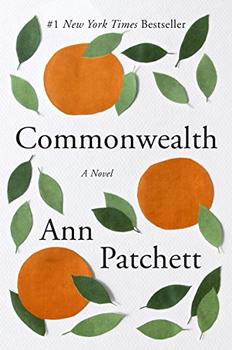Summary | Excerpt | Reading Guide | Reviews | Beyond the book | Read-Alikes | Genres & Themes | Author Bio

Opening Ann Patchett's novel Commonwealth about two semi-functional mid-late 20th century families feels like sliding into a comfy chair in a quiet tearoom with an old friend. Not the kind of friend who finishes your sentences, but the kind who's got lots of stories to tell about her trips to Machu Picchu or sub-Saharan Africa. That is, if you've read one of Patchett's books before. If not, then you're in for a real treat as her intimate prose winds its way into your psyche and puts you at immediate ease. You can trust her. She knows her way around your feelings and treats them with tenderness and respect.
It's June in Los Angeles, on a Sunday afternoon in the early 1960s. There's a christening party going on at the home of one of LA's Irish cops. Fix and Beverly Keating are celebrating their youngest daughter Franny's big day with a houseful of friends and relatives. And one party crasher. The party is winding down; trays of food are running low, as is the liquor supply. Bert Cousins, the uninvited, shows up with the best and only christening gift he could lay his hands on as he hastily abandons his pregnant wife Teresa and the couple's three other children for the chaos of a party with a family he barely knows. Gin. He comes bearing a big bottle of gin.
I saw this as a Chekhov gun. There is no tonic to go along with the gin so Fix has to leave the party to go pick some up. While he's gone the inventive guests begin to harvest oranges from the burgeoning fruit trees in the Keatings' backyard. By the time Fix returns with the tonic, an assembly line has formed. There's Bert, a little too merrily slicing, squeezing, juicing and mixing gin-and-orange-juice cocktails alongside Fix's stunningly beautiful wife, Beverly. A woman he finds irresistible:
He knew that making a move on a married woman was a bad idea, especially when you were in the woman's house and her husband was also in the house and the husband was a cop and the party was a celebration of the birth of the cop's second child. He knew all of this but as the drinks stacked up he told himself there were larger forces at work.
This day, Bert thought, was the beginning of his life. It was also the end of two marriages.
From here on the narrative voice switches between Fix at the end of his life, his and Beverly's youngest daughter Franny as an adult, and that of the blended children who spent summers together at Bert and Beverly's home in Virginia. "Here was the remarkable thing about the Keating children and the Cousins children: they did not hate one another, nor did they possess one shred of tribal loyalty…The six children had in common one overarching principle that cast their dislike for one another down to the bottom of the minor leagues: they disliked their parents. They hated them."
Though not told in chronological order, the story unfolds organically, each chapter building to the climax. And if it weren't for the fact that all of Patchett's books enjoy the same organic quality I might credit that to Commonwealth's autobiographical inspiration. (See Beyond the Book.) But Patchett just seems to know all of her characters so intimately, and they move in a world we recognize and say things we might given similar circumstances. Even their bad decisions – and there are many here – make sense at the time. She is a master who can create passages that will be with you for the rest of your life.
![]() This review was originally published in The BookBrowse Review in September 2016, and has been updated for the
May 2017 edition.
Click here to go to this issue.
This review was originally published in The BookBrowse Review in September 2016, and has been updated for the
May 2017 edition.
Click here to go to this issue.

If you liked Commonwealth, try these:

by Ann Napolitano
Published 2024
From the New York Times bestselling author of Dear Edward comes a poignant and engrossing family story that asks: Can love make a broken person whole?

by Melanie Benjamin
Published 2024
Two sisters navigate the thrilling, euphoric early days of California surf culture in this dazzling saga of ambition, sacrifice, and the tangled ties between mothers and daughters.
There is no such thing as a moral or immoral book. Books are either well written or badly written. That is all.
Click Here to find out who said this, as well as discovering other famous literary quotes!
Your guide toexceptional books
BookBrowse seeks out and recommends the best in contemporary fiction and nonfiction—books that not only engage and entertain but also deepen our understanding of ourselves and the world around us.